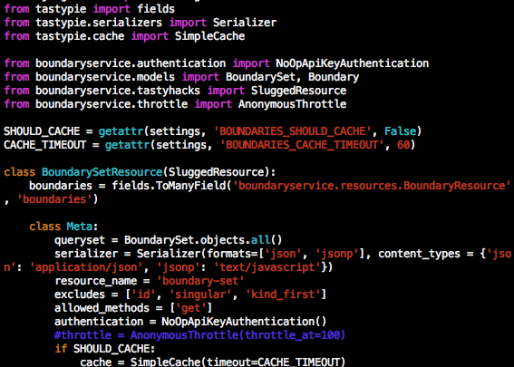
The Chicago Tribune News Apps team open-sourced Boundary Service, which has been modified and extended by other news organizations."
There hasn’t been such an exciting time for aspiring journalists since the advent of radio or television. With the proliferation of data and the computing power to mass process it, compelling stories lay in 1’s and 0’s just waiting to be told. Through these difficult times for the field, a new sub area has shown us hope: computational journalism. And, thanks to the open source movement of leading news organizations, it’s as simple as ever to get your foot in the door of truly great journalistic enterprises.
What is open source?
Journalism and open source software were made for each other. The open source movement shares key values with traditional journalism, where the hours are long and the paychecks small, but the do-good spirit (hopefully) prevails.
Open source, in terms of software, is based on the idea that information should be free –- a milestone of the Hacker Ethic. Systems are better built through communal collaboration than individual efforts. The movement began when computers were fledgling mammoths, and the field of computer science didn’t yet exist. By working together, the world’s earliest hackers built the foundations of the systems so essential to today’s environment. The individual was subordinate to the sum of the communal efforts. There were legendary hackers, of course, but largely it wasn’t about the ego race; it was the best way to move the world toward a better position.
Journalism needs open source
Traditional open source software shops build systems for whatever needs arise and publish code for others to download, modify and contribute to. Systems continue to be supported through fixes and new features submitted by the community as well as the original team. It may seem counterintuitive to give your hard work away for free, but in many situations, the benefits far outweigh the concern.
As the sizes of newsrooms dwindle, open source development is becoming a necessity to continue competing with startups for consumers’ attention. Instead of each news organization building a JavaScript mapping library, developers from across the world instead can work on a great implementation, for use by all. Such tools make election night data visualization possible for smaller news organizations, and they continue to push the limits for larger efforts.
You need open source, too
Open source is great for beginning computational journalists, too, because it lowers the barrier of entry. A few examples:
- A journalist looking to build an advanced map plotting population density has to look no further than the great Chicago Tribune News Apps Team’s blog. (Understandably, their motto is “Show Your Work.”)
- Curious about how the the L.A. Times builds its interactive news projects? A ton of their code is posted on GitHub.
- Want to run through the code of a production-ready elections app? NPR published its whole codebase.
There are many other news apps teams sprouting up, publishing code and tutorials in the name of open source. On an individual basis, the folks who hang out on the NICAR-L mailing list are a wonderful resource, as well as the data journalists I’ve identified in this Twitter list.
The open source nature of this emerging field makes in easier to get involved, and the jobs are out there for people working on the skills of data journalism. Now, go out there, learn and collaborate.
 This is the first of a series of blog posts from the first ONA class of AP-Google Journalism and Technology Scholars describing their experiences, projects and sharing their knowledge with the ONA community.
This is the first of a series of blog posts from the first ONA class of AP-Google Journalism and Technology Scholars describing their experiences, projects and sharing their knowledge with the ONA community.
Kevin Schaul is Data/Web Dev Intern at @StarTribune and is joining @nytgraphics for the summer.
